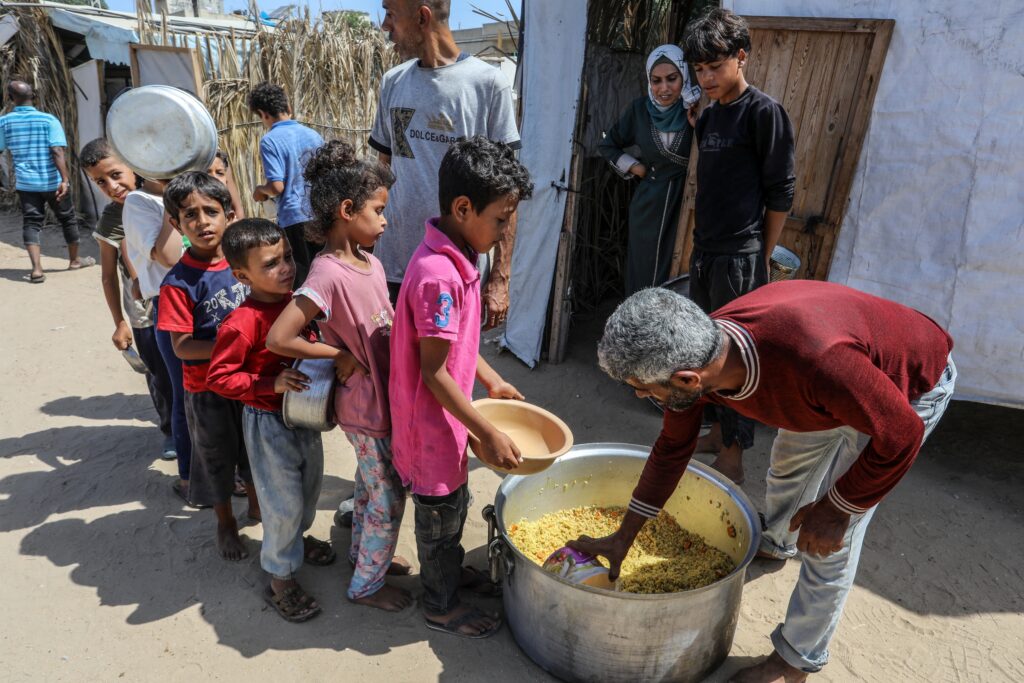IN THE MEDIA
Gaza, hunger and Jewish tradition
June 19, 2025 | Rabbi Ralph Genende

Australian Jewish News – 19 June 2025
It must be one of the most fearful words in the dictionary and in the vocabulary of our souls. Hunger hurts, hunger drives us to desperation, hunger gnaws at our stomachs and our souls.
Hunger and food deprivation loom large in our Jewish tradition and culture.
It’s in the Bible with its call to open our hearts to those suffering hunger. It’s in the prophets, it’s in the Talmud.
And just in case we mistakenly believe hunger is only felt by the needy, the Halacha demands that we learn how to fast. As the Talmud says: before a person eats, they have two caring hearts; after they have eaten, they are left with one selfish heart.
It says that if a person asks for food, you need to respond immediately; if they ask for other help first investigate whether they are genuine
Hunger in wartime poses many moral questions. For centuries besieging populations was seen as a legitimate act of warfare. As Jews, we experienced the sieges of Jerusalem by the Babylonians and the Romans.
Today, especially in the West, a siege is seen as reprehensible. Social media postings of malnourished children – often doctored, AI-generated or with misleading context – naturally tear at the heart of every caring human being. And that is why we need to talk about hunger claims in Gaza, myths and facts about the Israeli aid blockade, and the larger picture.
Given Jewish traditions regarding hunger, it is not surprising the blockade was controversial in Israel, notwithstanding that it was known that enough food had been stockpiled in Gaza for several months during the previous ceasefire. Moreover, when the IDF advised the Israeli Cabinet that starvation was potentially imminent, it resumed the food aid – while introducing new procedures designed to keep it from Hamas, as we have witnessed over recent weeks.
We also know how hunger is weaponised by Hamas, how it uses food aid to terrorise its own people and fund its military activities through its illegitimate sale. How it stole and stored huge amounts of food, and how it is now brutally trying to prevent others from controlling food distribution. Recent reports tell of Hamas deliberately sabotaging the US-backed Gaza Humanitarian Foundation’s (GHF) distribution of aid by gross intimidation, firing at civilians approaching the distribution hubs and urging them to cause chaos at these points. A bus carrying aid workers for the Gaza Humanitarian Foundation (GHF) was attacked last week in Gaza, causing fatalities and fears that some may have been taken hostage. Despite this, and even if Israel itself has made mistakes, hundreds of thousands of packages have been successfully given out – more than 7 million meals in eight days initially, and 2.5 million in a single day on June 11.
And yet the BBC, CNN and our ABC persistently fail to fact-check before running with the contention that the IDF is indiscriminately killing Gaza civilians trying to get food aid, while offering little if any mention of Hamas’ complicity.
We also know too well that reports of mass famine are so often exaggerated. This was certainly the case last year when repeated claims of imminent famine in Gaza by UN officials and other organisations dominated headlines, only to prove baseless. This year we had a senior UN official lie that “14,000 babies” would die within 48 hours without aid.
The Israeli Government’s controversial policies regarding aid fortunately appear to be working – Hamas is certainly desperate to stop the GFH food distribution and reports say it is in dire straits without the looted aid flows. Yet these policies have seen Israel’s reputation badly damaged.
Moreover, callous voices coming from some extreme right Israeli political leaders – people who would casually tolerate indiscriminate mass starvation as a way of destroying Hamas – have worsened the reputational damage. It is a dark stain on Jewish morality when they use our very tradition of compassion and combatting hunger to justify deliberately causing starvation.
Even as Jews should distance ourselves from such ugly distortions of our traditions, we also need to shout out that Israel recognises mass hunger in Gaza cannot be part of its just war, as Jewish tradition specifies, and when the threat of such hunger became real, Israel responded. We also need to speak out about how our enemies are so quick to distort the facts and our erstwhile friends are too fast to accept pro-Hamas fiction.
We also need to remind our fellow Australians that Hamas can end this war they started and stop hunger at any time. We need the world and our own extremists to know that we are a people guided by caring, compassion, and intimate knowledge of the horrors of hunger, even as Israel is also a country that needs to be guided by self-care and security.
At this challenging hour even in the midst of the war with Iran, the government and people of Israel will surely continue to open their hearts and find secure ways of opening their hands to all those who are hungry and in need.





